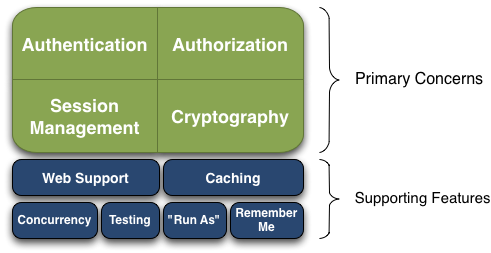1, What is Shiro security framework
shrio is a powerful and flexible open source security framework, which mainly deals with authentication, authorization, session management and encryption.
-
Authentication: sometimes referred to as "login", i.e. authentication of the user.
-
Authorization: the process of access control, that is, determining who has access to what.
-
Session management: user specific sessions can be managed even in non Web or EJB applications.
-
Encryption: use encryption algorithms to keep data secure while still being easy to use.
Supporting features:
- Web support: Shiro's web support API helps developers easily protect web applications.
- Caching: caching is the first layer of the Apache Shiro API to ensure that secure operations remain fast and efficient.
- Concurrency: Apache Shiro's concurrency feature supports multithreaded applications.
- Testing: test support helps you write unit and integration tests and ensures that your code is protected as expected.
- Run As: allows users to take on the identity of other users, if allowed, which is sometimes useful in management scenarios.
- Remember me: remember the user's identity throughout the session, so they log in only if necessary.

2, Write shiro basic code
1. Introduce relevant environment
The jar s related to shiro core and slf4j API are introduced. shiro uses slf4j to record logs.
<dependency>
<groupId>org.slf4j</groupId>
<artifactId>slf4j-api</artifactId>
<version>1.7.25</version>
</dependency>
<dependency>
<groupId>org.apache.shiro</groupId>
<artifactId>shiro-core</artifactId>
<version>1.2.2</version>
</dependency>2. Create ini file
src/main/resources/shiro.ini
# ini file configuration # ----------------------------------------------------------------------------- # User information format # username [user name] = password [password], role1 [role 1], role2 [role 2],..., role [role n] # ----------------------------------------------------------------------------- [users] root = 123456, admin guest = 123456, rolea user1 = 12345, roleb # ----------------------------------------------------------------------------- # Define role related permissions # roleName [role name] = perm1 [permission range], perm2,..., permn # *Similar to wildcards, representing any operation in the current scope # ----------------------------------------------------------------------------- [roles] admin = * rolea = book:bug roleb = book:add,book:delete
3. Reference procedure
package demo;
import org.apache.shiro.SecurityUtils;
import org.apache.shiro.authc.IncorrectCredentialsException;
import org.apache.shiro.authc.UnknownAccountException;
import org.apache.shiro.authc.UsernamePasswordToken;
import org.apache.shiro.config.IniSecurityManagerFactory;
import org.apache.shiro.mgt.SecurityManager;
import org.apache.shiro.session.Session;
import org.apache.shiro.subject.Subject;
import org.apache.shiro.util.Factory;
import org.slf4j.Logger;
import org.slf4j.LoggerFactory;
/**
* [Users, roles, and permissions are strings]
*
*
* */
public class Test {
//Create a log object for the current class
private static final transient Logger log=LoggerFactory.getLogger(Test.class);
public static void main(String[] args) {
//Create a factory, point to the ini file, and classpath represents the Src / main / resource directory
Factory<SecurityManager> fac=new IniSecurityManagerFactory("classpath:shiro.ini");
SecurityManager manager=fac.getInstance();
SecurityUtils.setSecurityManager(manager);
log.info("Environment initialization complete");
Subject currentUser=SecurityUtils.getSubject();
//System.out.println(currentUser);
Session session=currentUser.getSession();
session.setAttribute("message", "this is shiro");
System.out.println(session.getAttribute("message"));
//Whether the current user has verified
System.out.println(currentUser.isAuthenticated());
if(currentUser.isAuthenticated()) {
System.out.println("Already logged in");
}
else {
UsernamePasswordToken token =new UsernamePasswordToken("user1", "12345");
//token.setRememberMe(true);
try {
currentUser.login(token);
System.out.println("Login successfully");
} catch (UnknownAccountException e) {
System.out.println("user does not exist");
}catch (IncorrectCredentialsException e) {
System.out.println("Password error");
}
}
if(currentUser.hasRole("admin")) {
System.out.println("Welcome administrator");
}
if(currentUser.isPermitted("book:bug")) {
System.out.println("Allow to buy books");
}
if(currentUser.isPermitted("book:add")) {
System.out.println("Allow to add books");
}
if(currentUser.isPermitted("book:delete")) {
System.out.println("Allow books to be deleted");
}
currentUser.logout();
}
}

